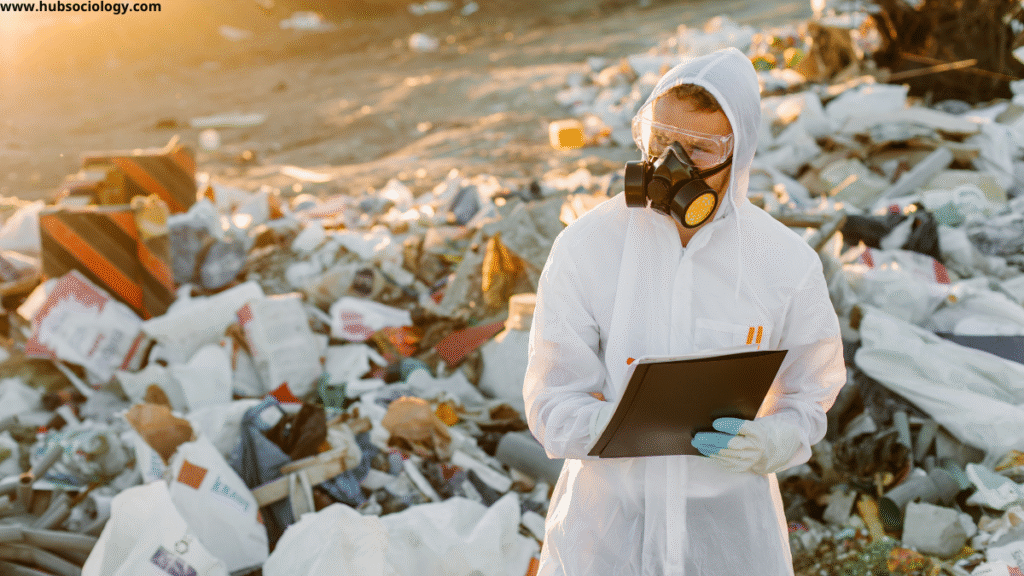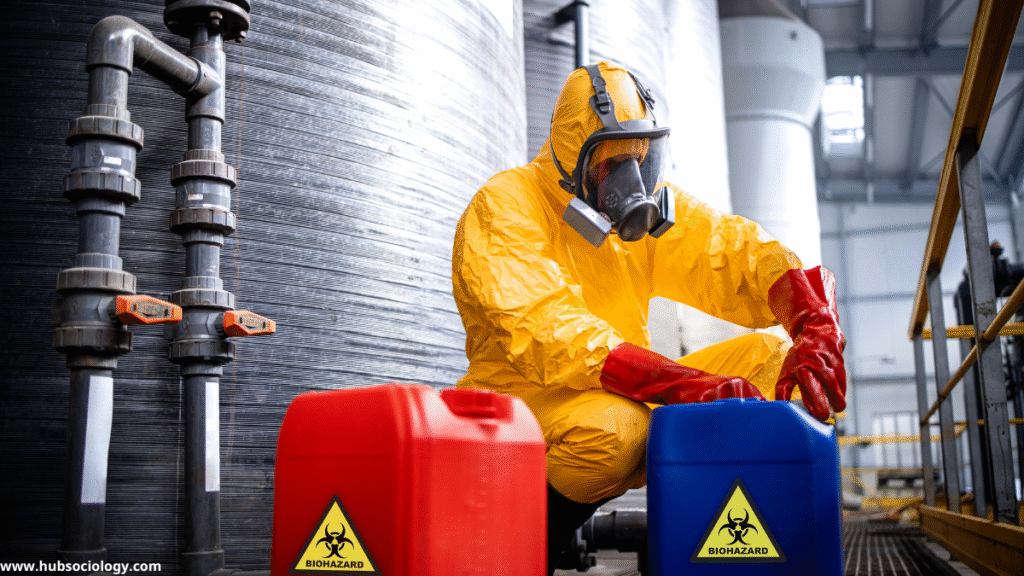Introduction on Theory of Risk Society of Modernity
The transformation of societies in the late twentieth and early twenty-first centuries has led to new forms of challenges that transcend traditional boundaries of class, geography, and politics. Among the thinkers who deeply analyzed these transformations, Ulrich Beck, a German sociologist, stands out for introducing the concept of the “Risk Society.” His theory explains how industrial modernity has produced risks that are global, unpredictable, and reflexive. Unlike earlier stages of development where scarcity and inequality dominated social concerns, the late modern world is increasingly defined by human-made risks—climate change, nuclear disasters, pandemics, and technological uncertainties.
This article examines Beck’s theory of risk society in the context of modernity, emphasizing its sociological dimensions, critiques, and relevance in contemporary times.

Table of Contents
Theoretical Background of Risk Society
Beck first outlined his theory in his influential book “Risk Society: Towards a New Modernity” (1986, English edition in 1992). He argued that modern societies have entered a new phase of development—“reflexive modernity”—where risks generated by scientific and technological progress dominate social organization and discourse.
Classical sociology, from Karl Marx to Émile Durkheim and Max Weber, largely focused on inequality, social solidarity, and rationalization. Beck did not dismiss these foundations but suggested that industrial modernity has shifted the central axis of social conflicts:
- From wealth distribution to risk distribution
- From external dangers (natural hazards) to manufactured risks (technological, ecological, and institutional failures)
In essence, risk society emerges when modernization produces problems that cannot be contained within traditional institutions like the state, science, or the market.
Features of Risk Society
Beck’s concept of risk society has several distinct features that highlight its uniqueness in understanding late modernity.

1. Manufactured Risks
Unlike natural risks such as floods or famines, modern risks are largely manufactured by human activity—industrial pollution, nuclear energy, genetically modified organisms, chemical hazards, or artificial intelligence disruptions. These are side-effects of modernization itself.
2. Globalization of Risk
Modern risks are global in scope, cutting across national and social boundaries. For instance, radiation from Chernobyl (1986) affected regions far beyond Ukraine, and climate change has consequences for all of humanity regardless of borders. Beck emphasized that risks ignore class, nation, and geography.
3. Reflexive Modernization
Modernity has become reflexive, meaning that society constantly evaluates and critiques the very processes of modernization that create risks. Scientific progress, once considered the path to certainty, is now itself questioned as a source of uncertainty.
4. Risk Beyond Social Class
Beck argued that while industrial society was structured around class divisions, risk society is organized around shared vulnerabilities. Though risks are unevenly distributed, their potential universality makes them collective concerns.
5. Crisis of Legitimacy
Institutions of modernity—science, government, law, and markets—lose legitimacy when they fail to control risks. Scientific knowledge, once trusted, is contested as “experts” often disagree. Governments, too, face declining credibility when unable to prevent disasters.
6. Individualization
Risk society also intensifies the individualization process. Individuals are compelled to manage their own risks—whether in health, career, or lifestyle—within uncertain conditions. Traditional structures like family or community provide less security in this context.
Risk Society and Modernity
Beck situates risk society as a second phase of modernity—after the industrial society of the 19th and early 20th centuries.
- First Modernity (Industrial Society): Characterized by progress, class conflicts, and the pursuit of economic growth. Risks were considered external or natural (e.g., drought, disease).
- Second Modernity (Reflexive Modernity): Characterized by the side effects of industrialization—environmental pollution, nuclear accidents, global warming, and global terrorism. Here, risks are seen as man-made, unpredictable, and uncontrollable.
This shift from first to second modernity signals a fundamental transformation of society’s structure, priorities, and conflicts.
Examples of Risk Society
To illustrate Beck’s theory, several real-world examples highlight how risks shape modern societies:
- Chernobyl and Fukushima Nuclear Disasters: These accidents symbolized the uncontrollability of technological risks and the limits of expert knowledge.
- Climate Change: Global warming is the quintessential example of manufactured and globalized risk, requiring transnational cooperation but often producing conflict.
- COVID-19 Pandemic: A global health crisis that highlighted both the vulnerability of modern societies and the politicization of scientific advice.
- Digital Risks: Cybersecurity threats, data privacy issues, and AI-related disruptions represent new dimensions of risk in the digital age.
These examples confirm Beck’s claim that modernity generates risks beyond the control of traditional nation-states and institutions.
Sociological Implications of Risk Society
Beck’s theory has profound implications for sociological thought:

1. Rethinking Inequality
While risk society does not erase inequality, it adds new dimensions to social stratification. For example, poorer communities may be more exposed to pollution or unsafe working conditions, though risks like climate change also affect wealthy societies.
2. Transformation of Politics
Risk society produces what Beck calls “sub-politics”—where social movements, NGOs, and transnational actors challenge state authority in managing risks. Environmental movements like Greenpeace or climate justice campaigns embody this shift.
3. Knowledge and Uncertainty
Science, once a source of certainty, now generates contested knowledge. Sociologists note how expert disagreements (e.g., on climate models or vaccine safety) reflect the reflexive character of modernity.
4. Globalization and Cosmopolitanism
Beck suggested that risk society necessitates a cosmopolitan outlook. Since risks cross borders, cooperative global governance becomes essential. The Paris Climate Agreement is an example of attempts at such collective responsibility.
5. Individual Responsibility
Individuals must navigate risks in their everyday lives—from diet and health to job security—often without adequate institutional support. This fosters anxiety and precariousness but also increases reflexivity in personal decision-making.
Critiques of Beck’s Theory
While Beck’s theory has been influential, it has faced criticism:
- Overemphasis on Novelty: Critics argue that societies have always faced risks, such as plagues or wars. Beck may exaggerate the uniqueness of modern risks.
- Class Neglect: Some sociologists, like Anthony Giddens, point out that Beck underplays the persistence of class inequalities in shaping exposure to risks.
- Western-Centric Perspective: Beck’s analysis is rooted in Western modernity and may not fully capture risk experiences in the Global South. For example, poverty-driven risks remain as pressing as manufactured risks in many developing societies.
- Optimism about Reflexivity: Beck assumes reflexive modernization leads to greater awareness and democratic change. In practice, risks are often politicized and manipulated by powerful actors, limiting reflexive outcomes.
Despite these critiques, Beck’s framework remains foundational in contemporary sociology.
Relevance in Contemporary Society
The risk society thesis is increasingly relevant in understanding today’s challenges:
- Environmental Sociology: Beck’s ideas are central to analyzing climate change and ecological crises.
- Health Sociology: The COVID-19 pandemic reaffirmed the global interconnectedness of risks.
- Digital Sociology: Issues like surveillance, algorithmic bias, and AI threats are extensions of manufactured risks.
- Global Governance: Beck’s call for cosmopolitan cooperation remains urgent as states struggle to coordinate responses to global threats.
In many ways, Beck anticipated the insecurities of the twenty-first century, where risks, rather than material scarcity, dominate global agendas.
Conclusion on Theory of Risk Society of Modernity
Ulrich Beck’s theory of risk society marks a profound shift in sociological thought, emphasizing the role of manufactured, global, and reflexive risks in shaping modern life. Moving beyond the classical focus on class conflict, Beck highlights how modernization itself generates uncertainties that institutions struggle to manage. Despite critiques of Western bias and neglect of inequality, his framework provides a powerful lens to understand climate change, technological disruption, pandemics, and globalization. In the age of uncertainty, Beck’s risk society remains not just a theory but a lived reality, urging societies to rethink progress, responsibility, and cooperation in an interconnected world.
Do you like this this Article ? You Can follow as on :-
Facebook – https://www.facebook.com/hubsociology
Whatsapp Channel – https://whatsapp.com/channel/0029Vb6D8vGKWEKpJpu5QP0O
Gmail – hubsociology@gmail.com
Exam-Style Questions on Theory of Risk Society of Modernity
5 Marks Questions on Theory of Risk Society of Modernity (Short Answer)
- Define Ulrich Beck’s concept of Risk Society.
- What is meant by “manufactured risks” in Beck’s theory?
- Differentiate between first modernity and second modernity.
- What role does globalization play in the risk society?
- Give two examples of risks that illustrate Beck’s theory of risk society.
10 Marks Questions on Theory of Risk Society of Modernity (Medium Answer)
- Explain the key features of risk society as proposed by Beck.
- How does Beck’s theory of risk society differ from classical sociology’s concerns about inequality?
- Discuss the role of reflexive modernization in understanding risk society.
- “Risk society shifts the central axis of social conflict from wealth to risk.” – Discuss with examples.
- Critically analyze Beck’s idea that risks are beyond social class.
15 Marks Questions on Theory of Risk Society of Modernity (Long Answer/Essay)
- Examine Ulrich Beck’s theory of risk society in the context of modernity, with suitable examples.
- Discuss the sociological implications of risk society in terms of inequality, politics, and globalization.
- Evaluate the relevance of Beck’s risk society in understanding contemporary global issues like climate change, pandemics, and digital risks.
- Critically assess the strengths and limitations of Beck’s theory of risk society.
- “Risk society is not only about dangers but also about reflexivity and transformation.” – Discuss with reference to Beck’s arguments.

1 thought on “Theory of Risk Society of Modernity (Beck): A Sociological Perspective”